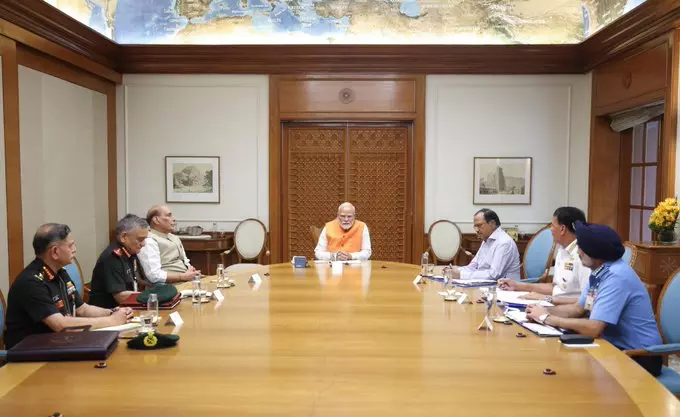Pahalgam: PM Grants Forces Full Operational Freedom
The Prime Minister expressed complete faith and confidence in the professional abilities of the armed forces

NEW DELHI: Prime Minister Narendra Modi on Tuesday told India's military leadership that they have complete operational freedom to decide on the mode, targets and timing of India’s military response to the April 22 Pahalgam terror attack.
At a 90-minute meeting with defence minister Rajnath Singh, National Security Adviser Ajit Doval, Chief of Defence Staff Gen. Anil Chauhan and chiefs of the three services — General Upendra Dwivedi, Air Chief Marshal A.P. Singh and Admiral Dinesh Tripathi — at his residence at 7 Lok Kalyan Marg, Modi said, “It is our national resolve to deal a crushing blow to terrorism.”
The Prime Minister expressed complete faith and confidence in the professional abilities of the armed forces. He held back-to-back meetings on Tuesday with the stakeholders, a clear pointer to a decisive action in the offing against the terrorists and their backers.
After chairing a meeting with the top defence establishment, Modi also met RSS chief Mohan Bhagwat and Union home minister Amit Shah, indicating the government intended to take the Sangh into confidence over action against the terror groups.
Significantly, the Union Cabinet will be meeting on Wednesday for the first time since the Pahalgam terror attack that left 26 tourists dead. The Prime Minister will also be chairing a meeting of the Cabinet Committee on Security (CCS), which takes important decisions regarding national security. Besides the CCS, the Prime Minister will also chair meetings of the Cabinet Committee of Economic Affairs (CCEA) and the Cabinet Committee on Political Affairs (CCPA) to deliberate on the evolving security scenario and counter responses.
After the CCS meeting, India had on last Wednesday announced a number of measures, including downgrading diplomatic ties with Pakistan and suspension of the over six-decade-old Indus Waters Treaty.
In another development on Tuesday, Union home secretary Govind Mohan chaired a high-level meeting which was attended by chiefs of three paramilitary forces and senior officers of two other security organisations, sources said.
The meeting was held amid the charged atmosphere following the Pahalgam terror attack. Directors-General Daljit Singh Chaudhary (Border Security Force), Brighu Srinivasan (National Security Guard ) and Lt. Gen. Vikas Lakhera (Assam Rifles) attended the meeting, the sources said.
Additional director-general of the Sashastra Seema Bal (SSB) Anupama Nilekar Chandra was, among the other attendees in the meeting. It was not immediately ascertained what transpired in the meeting.
The BSF secures India's international borders with Pakistan and Bangladesh, the SSB guards the friendly borders with Nepal and Bhutan, the Assam Rifles protects the frontier with Myanmar and the NSG is an anti-terror contingency force.
Meanwhile, authorities have identified the premises of 16 schools in Delhi for temporary deployment of a communication set-up by the IAF as part of an air exercise, according to an official communication. The exercise is from April 28 to May 2. The premises are to be used for "temporary" deployment of communication equipment.
Modi has vowed to pursue the terrorists behind the Pahalgam attack and their patrons, a clear reference to Pakistan, which has a history of sponsoring terror attacks in India, to the "ends of earth" and inflict the harshest punishment on them "beyond their imagination".
The Prime Minister's tough assertions coupled with his government's avowed muscular stand on the issues of national security have heightened expectations of a stringent counteraction from India.
In the past, the Modi government carried out surgical strikes inside Pakistan after the terror attack on army soldiers in Uri in 2016 and the Balakot air strike after the killings of CRPF personnel in Pulwama in 2019.

